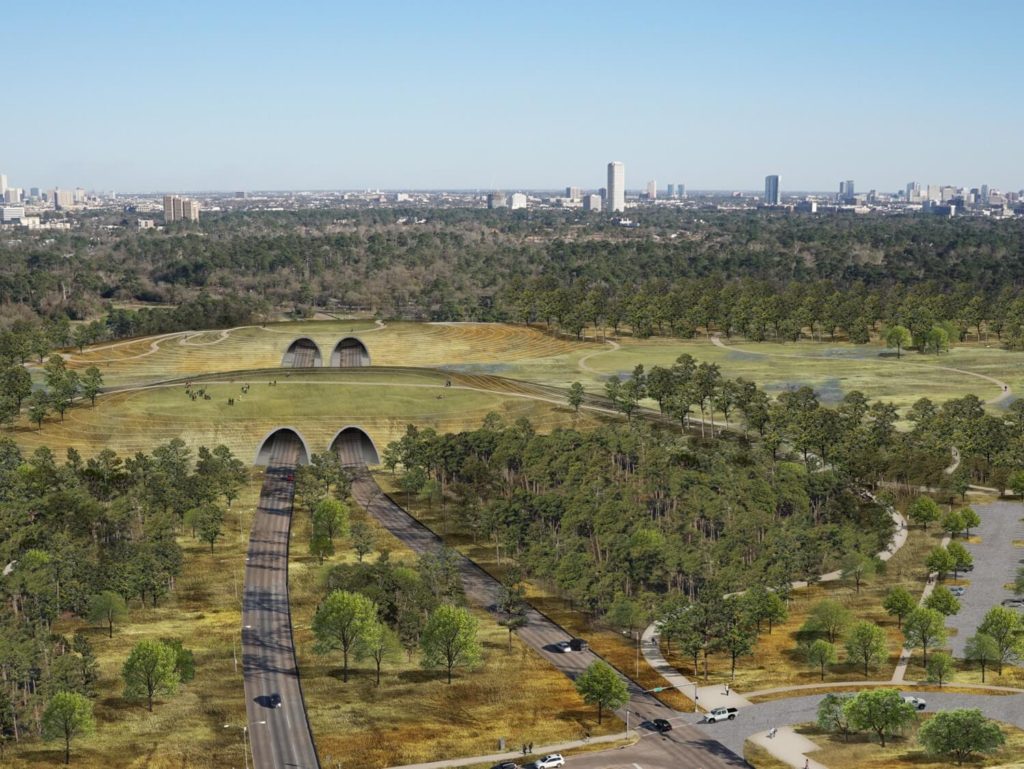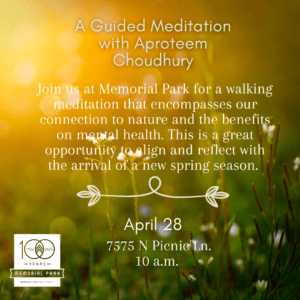Memorial Park accelerates visionary plan with $70 million gift from Kinder Foundation
Houston’s largest single parks grant is catalyst for public-private partnership with City of Houston

Kinder Foundation is offering a grant of $70 million to fast-track Memorial Park’s Master Plan, one of the nation’s largest and most visionary urban park restorations, led by Memorial Park Conservancy (MPC), Houston Parks and Recreation Department (HPARD), and the Uptown Development Authority (UDA).
Today, a revised and restated Memorial Park Development Agreement was presented before the Quality of Life Committee of the City Council and is pending council approval. The planning partners outlined a private-public funding framework, built from Kinder Foundation’s lead gift, for developing a significant portion of the Master Plan within the next decade.
“With the City Council’s approval, this historic gift will enhance a park that draws users from all over Houston, boosts the city’s entire park system and help make Houston more flood-resilient,” said Mayor Sylvester Turner. “The Kinders’ past generosity to several signature Houston parks, along with this latest magnificent gesture, means their foundation is ever more a constant catalyst for health, recreation, community engagement, appreciation of nature, green space preservation and other quality-of-life factors that help make our city great. Let’s all applaud Kinder Foundation for its vision and commitment to making Memorial Park a treasured destination place for years to come.”
Kinder Foundation has been instrumental in Houston’s nationally recognized green space renaissance over the past ten years, gifting transformational grants that often serve as a catalyst for additional philanthropic and government funding, including Discovery Green, Buffalo Bayou Park, and Bayou Greenways 2020. Kinder Foundation’s $70 million lead gift to Memorial Park – the largest single parks grant in Houston history – resulted from conversations over a two-year period and specifically supports connectivity to and within the Bayou City’s largest urban park, Memorial Park.
“Memorial Park, one of the nation’s largest parks, is much-loved by Houstonians and requires ongoing maintenance,” states Rich Kinder, chairman, Kinder Foundation. “Our experience is that it takes a carefully designed public-private partnership to ensure that a park reaches its true potential. The partnership the Kinder Foundation has conceived with the City sets the stage for a more vibrant Memorial Park.”
Designated to complete priority projects over the next 10 years, as well as provide long-term care of these capital improvements and the overall park, Kinder Foundation’s gift is slightly more than half of the $125 million in private sector funding to be raised by MPC. Augmenting Kinder Foundation’s $70 million will be $15 million previously secured by MPC and $40 million in new donor commitments.
Kinder Foundation’s lead gift also leverages the potential for $30 million in federal support, alongside UDA’s $50 million investment for infrastructure improvements. With this restated agreement, HPARD will regain $600,000 in annual fees previously committed for green space maintenance and the Cullen Running Trails Center operations.
“We are thankful to the Kinder Foundation for their continuing support of parks throughout the city. The funds regained will be a catalyst for our ongoing Neighborhood Playground Initiative,” said Steve Wright, director, HPARD.
A sustainable, resilient urban center
Memorial Park is unique on a local and national scale because of its central location and size; at 1,500 acres, Houston’s largest green asset inside the city, is almost double the size of New York’s Central Park. Therefore, restoring, enhancing, and protecting the Park’s natural environment, deployed through a science-based, data-driven method, serves as a nationwide model for urban forest and park renewal. The Central Connector also includes significant acreage of native prairie restoration. By promoting the Park’s healthy ecologies and habitants, Memorial Park can sustainably balance conservation with recreational opportunity. Furthermore, subsequent ecological resiliency will help retain stormwater onsite and reduce erosion into Buffalo Bayou, while improved drainage will streamline emergency vehicle transit on Memorial Drive during major floods.
A city connected through Memorial Park
Projects completed as a result of this public-private partnership will connect neighborhoods to neighborhoods through Memorial Park, as well as attach Memorial Park to the growing hike-and-bike networks across Houston. Hundreds of acres of parkland currently inaccessible will become accessible, and urban barriers that isolate and segregate the Park will be replaced with bridges and access points. An iconic central connector will be built over Memorial Drive.
Planned
for national and international distinction, this unique nature bridge
will connect the Park’s north and south sides, providing safe crossing
for all people and wildlife within a cohesive park experience of
restored prairie and trails. Other additions include a trail/bridge
system north over I-10, linking the White Oak Bayou Greenway trail
system, and south over Buffalo Bayou; a 1.5-mile accessibility trail
through the 600-acre wilderness on the south side; and other trails and
crossings.
Sarah Newbery, project director for Memorial Park with
UDA says, “Infrastructure plays a pivotal role in reconnecting Memorial
Park’s contiguous acreage, while providing safe and easy access.”
A park for all citizens
Today, Memorial Park serves 4 million users each year and draws residents from 170 zip codes across greater Houston. Thousands of visitors use the park’s signature exercise trail daily, and countless others enjoy its highly regarded 18-hole public golf course, tennis, swimming, cycling, 30 miles of trails, bird watching, and fitness facilities. Over the next decade, the 100-acre Eastern Glades project, already in progress, will add a large, quiet, and shady respite for picnicking, leisurely strolls, and other passive pastimes, and will feature a 5-acre lake and wetlands. Other developments include Memorial Groves, a tribute site that will honor Memorial Park’s original use as one of only 16 National Guard training camps for WWI soldiers; a running complex, with a quarter-mile timing track and concessions; replaced and rebuilt ball fields; and ancillary parking, restrooms, and signage.
“Our 10-year timeline reflects keen focus on connectivity to and through Memorial Park; resiliency through ecological renewal; and aesthetic and historic preservation, amid cultural and recreational amenities,” states Shellye Arnold, president and chief executive officer, MPC.
Memorial Park’s Master Plan
In 2012, amid collective concerns for Memorial Park’s increased traffic, lack of accessibility, and environmental decline, the City asked MPC to develop a long-range master plan for Memorial Park that became critical after Houston’s historic drought. The nationally acclaimed landscape architectural firm, Nelson Byrd Woltz, led the Master Plan’s design, incorporating vast public and stakeholder input as well as expert consults from ecological, biological and conservation scientists. Nelson Byrd Woltz achieves restoration, beautification and excellence through organic revitalization, indigenous design, integrity of historical intent, and stewardship of space – hallmarks desired for the park’s restoration – making them perfect partners to ensure Memorial Park’s sustainable future. Ecological restoration underpins the Master Plan, an area in which the design firm has significant experience.
Thomas L. Woltz, Principal, Nelson Byrd Woltz Landscape Architects stated, “This is a rare opportunity to set Memorial Park on a more resilient course – to ensure longevity for the thousands of people using it every day; to create a rich and varied ecosystem that will enhance the user experience; and to envision and articulate the critical balance between intense use and preservation.”
The Master Plan was approved unanimously by Houston City Council in 2015. The Kinder Foundation gift will accelerate the impact of pledges from the Houston philanthropic community including The Brown Foundation, Inc., The Cullen Foundation, The Fondren Foundation, Wendy and Jeff Hines, Houston Endowment, Inc., Christopher Knapp in honor of the David M. Underwood Sr. family, The Wortham Foundation, Inc. and other generous foundations and individuals.
The value of green space
In the nation’s fourth largest and most diverse population, Houston’s parks, greenways, and public spaces serve a vital role as common ground, where people from disparate backgrounds and socio-economic stations naturally traverse. A growing national trend, ‘quality of green space’ has earned singular significance, with quality of life increasingly desired, and community health contingent on public space. Parks and greenways improve mobility, connectivity, and economic vitality, while providing a bucolic refuge from the stresses of urban life. As revealed in a City Parks Alliance 2018 video, “City Parks: Americas new Infrastructure,” activities in parks make people healthier; every dollar spent creating and maintaining trails offsets three dollars in healthcare expenses. Parks serve neighborhoods as gathering hubs and provide recreation and social interaction that may otherwise not exist.
Parks are for the people, so Houston’s extraordinary investment across philanthropic, government, and non-profit sectors improves quality of life in Houston for all walks of life.
About Memorial Park Conservancy
Memorial Park Conservancy is a non-profit organization created to restore, preserve, and enhance Memorial Park for the enjoyment of all Houstonians, today and tomorrow. Incorporated in 2000, the Conservancy’s vision is to implement the principles of world-class park management and stewardship in partnership with the Houston community. A volunteer Board of Directors is led by Chairman Steve Jenkins, and a highly qualified staff works under the leadership of President & CEO Shellye Arnold. As of February 2016, Memorial Park Conservancy is operationally responsible for managing 1,100 of the Park’s 1,500 acres including the green spaces, open spaces and trails. For more information, visit www.memorialparkconservancy.org.
About Kinder Foundation
The Kinder Foundation, a family foundation established in 1997 by Rich and Nancy Kinder of Houston, Texas, provides transformational grants that impact urban green space, education, and quality of life. More at kinderfoundation.org.




